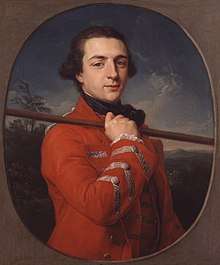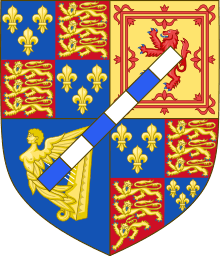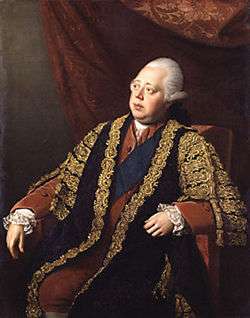Augustus FitzRoy, 3rd Duke of Grafton
Augustus Henry FitzRoy, 3rd Duke of Grafton, KG, PC (28 September 1735 – 14 March 1811), styled Earl of Euston between 1747 and 1757, was a British Whig statesman of the Georgian era. He is one of a handful of dukes who have served as Prime Minister.
His Grace The Duke of Grafton KG PC | |
|---|---|
 Portrait by Pompeo Batoni | |
| Prime Minister of Great Britain | |
| In office 14 October 1768 – 28 January 1770 | |
| Monarch | George III |
| Preceded by | The Earl of Chatham |
| Succeeded by | Lord North |
| Personal details | |
| Born | 28 September 1735 |
| Died | 14 March 1811 (aged 75) Euston Hall, Suffolk |
| Resting place | St Genevieve Churchyard, Euston, Suffolk |
| Political party | Whig |
| Spouse(s) |
|
| Children | 12, including |
| Parents | Lord Augustus FitzRoy (father) |
| Alma mater | Peterhouse, Cambridge |
| Signature | |
He became Prime Minister in 1768 at the age of 33, leading the supporters of William Pitt, and was the youngest person to have held the office until the appointment of William Pitt the Younger 15 years later. However, he struggled to demonstrate an ability to counter increasing challenges to Britain's global dominance following the nation's victory in the Seven Years' War. He was widely attacked for allowing France to annex Corsica, and stepped down in 1770, handing over power to Lord North.
Background and education
He was a son of Lord Augustus FitzRoy, a Captain in the Royal Navy,[1] and Elizabeth Cosby, daughter of Colonel William Cosby, who served as a colonial Governor of New York. His father was the third son of the 2nd Duke of Grafton and Lady Henrietta Somerset, which made FitzRoy a great-grandson of both the 1st Duke of Grafton and the Marquess of Worcester. He was notably a fourth-generation descendant of King Charles II and the 1st Duchess of Cleveland; the surname FitzRoy stems from this illegitimacy. His younger brother was the 1st Baron Southampton. From the death of his uncle in 1747, he was styled Earl of Euston as his grandfather's heir apparent.

Lord Euston was educated at Newcome's School in Hackney and at Westminster School, made the Grand Tour, and obtained a degree at Peterhouse, University of Cambridge.[2]
Political career
In 1756, he entered Parliament as MP for Boroughbridge, a pocket borough; several months later, he switched constituencies to Bury St Edmunds, which was controlled by his family. However, a year later, his grandfather died and he succeeded as 3rd Duke of Grafton, which elevated him to the House of Lords.
He first became known in politics as an opponent of Lord Bute,[3] a favourite of King George III. Grafton aligned himself with the Duke of Newcastle against Lord Bute, whose term as Prime Minister was short-lived largely because it was felt that the peace terms to which he had agreed at the Treaty of Paris were not a sufficient return for Britain's performance in the Seven Years' War.
In 1765, Grafton was appointed a Privy Counsellor; then, following discussions with William Pitt the Elder, he was appointed Northern Secretary in Lord Rockingham's first government. However, he retired the following year, and Pitt (by then Lord Chatham) formed a ministry in which Grafton was First Lord of the Treasury but not Prime Minister.[4]
Chatham's illness, at the end of 1767, resulted in Grafton becoming the Government's effective leader (he is credited with entering the office of Prime Minister in 1768), but political differences, the impact of the Corsican Crisis and the attacks of "Junius" led to his resignation in January 1770. Also, in 1768, Grafton became Chancellor of Cambridge University.[5] He became Lord Privy Seal in Lord North's ministry (1771) but resigned in 1775, being in favour of conciliatory action towards the American colonists. In the second Rockingham ministry of 1782, he was again Lord Privy Seal and continued in post in the following Shelburne ministry until March 1783.[4]
Religious interests
In later years he was a prominent Unitarian, being one of the early members of the inaugural Essex Street Chapel under Rev. Theophilus Lindsey when founded in 1774. Grafton had associated with a number of liberal Anglican theologians when at Cambridge, devoted much time to theological study and writing after leaving office as Prime Minister. In 1773 in the House of Lords he supported a bill to release Anglican clergy from subscribing to all the Thirty-nine Articles. He became an advocate of moral reformation among the upper classes and of liturgical reform. He was author of:
- Hints Submitted to the Serious Attention of the Clergy, Nobility and Gentry, by a Layman (1789).
- Serious Reflections of a Rational Christian from 1788–1797.
He was a sponsor of Richard Watson's Consideration of the Expediency of Revising the Liturgy and Article of the Church of England (published 1790) and he funded the printing of 700 copies of Griesbach's edition of the Greek New Testament in 1796.[6]
Horseracing
The Duke also had horse racing interests. His racing silks were sky blue, with a black cap.[7]
Legacy
Grafton County, New Hampshire,[8] in the United States, is named in his honour, as are the towns of Grafton, New South Wales, Australia, the town of Grafton, New York, the unincorporated community of Grafton, Virginia, and possibly the township (since 1856 a city) of Grafton, West Virginia. The Grafton Centre Shopping Mall in Cambridge is also named after him, and indeed lies on Fitzroy Street. Cape Grafton in Far North Queensland was named after him by Lieutenant James Cook during his first voyage of discovery.
Grafton had the longest post-premiership of any prime minister in British history, totalling 41 years and 45 days.
Family

On 29 January 1756, he married The Hon. Anne Liddell, daughter of Henry Liddell, 1st Baron Ravensworth (1708–1784). They had three children:
- Lady Georgiana FitzRoy[9] (8 May 1757 – 18 January 1799), who married John Smyth (12 February 1748 – 12 February 1811) on 4 June 1778.
- George Henry FitzRoy, 4th Duke of Grafton (1760–1844)
- General Lord Charles FitzRoy (14 July 1764 – 20 December 1829), who married, firstly, Frances Mundy (1773 – 9 August 1797) on 20 June 1795, and had one son. He married, secondly, Lady Frances Stewart (24 June 1777 – 9 February 1810) on 10 March 1799 and had three children. His sons Sir Charles FitzRoy (1796–1858), governor of New South Wales, and Robert FitzRoy, the hydrographer, were notable for their achievements.[10]
In 1764, the Duke had a very public affair with the courtesan Nancy Parsons[11] whom he kept at his town house and took to the opera. This brazen lack of convention offended society's standards. After the Duchess had become pregnant by her lover, the Earl of Upper Ossory, she and the Duke were divorced by Act of Parliament, passed 23 March 1769.[12] Three months later, on 24 June 1769, the Duke married Elizabeth Wrottesley (1 November 1745 – 25 May 1822), daughter of the Reverend Sir Richard Wrottesley, Dean of Worcester.[13] They had the following children:
- Lord Henry FitzRoy (9 April 1770 – 7 June 1828), clergyman; he married Caroline Pigot (died 1 January 1835) on 10 September 1800 and had five children. Ancestor of Daisy Greville, Countess of Warwick.
- Lord Frederick FitzRoy (born 16 September 1774; died young).
- Lady Augusta FitzRoy (1779 – 29 June 1839), who married Rev. George F. Tavel (died 1829) on 19 November 1811.
- Lady Frances FitzRoy (1 June 1780 – 7 January 1866), who married the 1st Baron Churchill on 25 November 1800.
- Admiral Lord William FitzRoy (1 June 1782 – 13 May 1857), who married Georgiana Raikes (died 2 December 1861) in 1816 and had two children.
- Lord John Edward FitzRoy (24 September 1785 – 28 December 1856), MP, died unmarried.
- Lady Charlotte FitzRoy (died 23 June 1857).
- Lady Elizabeth FitzRoy (died 13 March 1839), who married her cousin Lt. Gen. The Hon. William FitzRoy (1773–1837), son of the 1st Baron Southampton, on 4 July 1811.
- Lady Isabella FitzRoy (died 10 December 1866), who married Barrington Pope Blachford (3 December 1783 – 14 May 1816) on 11 August 1812.
Grafton was thus the first British Prime Minister, before Sir Anthony Eden,[14] to be divorced and the second, after Sir Robert Walpole, to marry while in office. Grafton would be the only Prime Minister to divorce and remarry whilst in office until 2020.[15]
Arms
 |
|
Cabinet of the Duke of Grafton
Notes
- Lundy, Darryl (17 December 2012). "Person Page". Retrieved 26 August 2011.
- "Fitzory, Augustus Henry (FTSY751AH)". A Cambridge Alumni Database. University of Cambridge.
- . Dictionary of National Biography. London: Smith, Elder & Co. 1885–1900.
-

- Institute of Historical Research. "The University of Cambridge: Chancellors". British History Online. Retrieved 11 October 2018.
- Durrant 2004, p. 928.
- Weatherby, Edward and James (1801). "COLOURS WORN BY THE RIDERS OF THE FOLLOWING NOBLEMEN, GENTLEMEN, &c". Racing Calendar. 28: 52.
- Gannett, Henry (1905). The Origin of Certain Place Names in the United States. U.S. Government Printing Office. p. 140.
- "Portrait of Lady Georgina Smyth and her son 1780c". Historical Portraits Image Library. Philip Mould Fine Paintings. Archived from the original on 3 March 2016.
- Chisholm 1911.
- "Anne Fitzpatrick". Oxford Dictionary of National Biography (online ed.). Oxford University Press. doi:10.1093/ref:odnb/88658. (Subscription or UK public library membership required.)
- Durrant 2004.
- Hellicar 1978, p. 28
- Eden's divorce was in 1950 and he remarried in 1952, prior to reaching office as Prime Minister.
- https://www.bbc.com/news/uk-51691434
Bibliography
- Durrant, Peter (2004). Oxford Dictionary of National Biography. 19. Oxford University Press. ISBN 978-0-19-861369-5.CS1 maint: ref=harv (link)
Further reading
- Hellicar, Eileen (1 January 1978). "Duke of Grafton (Augustus Henry Fitzroy)". Prime Ministers of Britain. David & Charles. ISBN 978-0-7153-7486-3.
External links
- The Third Duke of Grafton
- More about Augustus Henry Fitzroy, Duke of Grafton on the 10 Downing Street website.
- Hansard 1803–2005: contributions in Parliament by the Duke of Grafton
| Political offices | ||
|---|---|---|
| Preceded by The Earl of Sandwich |
Secretary of State for the Northern Department 1765–1766 |
Succeeded by Henry Seymour Conway |
| Preceded by The Marquess of Rockingham |
First Lord of the Treasury 1766–1770 |
Succeeded by Lord North |
| Leader of the House of Lords 1766–1770 |
Succeeded by The Viscount Weymouth | |
| Preceded by The Earl of Chatham |
Prime Minister of Great Britain 14 October 1768 – 28 January 1770 |
Succeeded by Lord North |
| Preceded by The Earl of Suffolk and Berkshire |
Lord Privy Seal 1771–1775 |
Succeeded by The Earl of Dartmouth |
| Preceded by The Earl of Dartmouth |
Lord Privy Seal 1782–1783 |
Succeeded by The Earl of Carlisle |
| Parliament of Great Britain | ||
| Preceded by William Murray Sir Cecil Bisshopp, Bt |
Member of Parliament for Boroughbridge 1756–1757 Served alongside: Sir Cecil Bisshopp, Bt |
Succeeded by Sir Cecil Bisshopp, Bt Thomas Thoroton |
| Preceded by Viscount Petersham Felton Hervey |
Member of Parliament for Bury St Edmunds 1756–1757 Served alongside: Felton Hervey |
Succeeded by Felton Hervey Augustus Hervey |
| Honorary titles | ||
| Preceded by The Duke of Grafton |
Lord Lieutenant of Suffolk 1757–1763 |
Succeeded by The Lord Maynard |
| Preceded by The Viscount Maynard |
Lord Lieutenant of Suffolk 1769–1790 |
Succeeded by Earl of Euston |
| Records | ||
| Preceded by Lord North |
Oldest living Prime Minister of Great Britain 1792–1800 |
Acts of Union 1800 merged Great Britain and Ireland to form the United Kingdom |
| New title |
Oldest living Prime Minister of the United Kingdom 1801–1811 |
Succeeded by The Viscount Sidmouth |
| Academic offices | ||
| Preceded by The Duke of Newcastle |
Chancellor of the University of Cambridge 1768–1811 |
Succeeded by The Duke of Gloucester and Edinburgh |
| Peerage of England | ||
| Preceded by Charles FitzRoy |
Duke of Grafton 1757–1811 |
Succeeded by George FitzRoy |
.svg.png)
